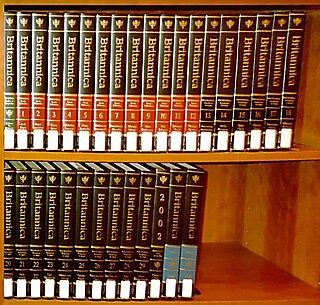
An encyclopedia or encyclopædia is a reference work or compendium providing summaries of knowledge either general or special to a particular field or discipline. Encyclopedias are divided into articles or entries that are arranged alphabetically by article name or by thematic categories, or else are hyperlinked and searchable. Encyclopedia entries are longer and more detailed than those in most dictionaries. Generally speaking, encyclopedia articles focus on factual information concerning the subject named in the article's title; this is unlike dictionary entries, which focus on linguistic information about words, such as their etymology, meaning, pronunciation, use, and grammatical forms.

Encyclopédie, ou dictionnaire raisonné des sciences, des arts et des métiers, better known as Encyclopédie, was a general encyclopedia published in France between 1751 and 1772, with later supplements, revised editions, and translations. It had many writers, known as the Encyclopédistes. It was edited by Denis Diderot and, until 1759, co-edited by Jean le Rond d'Alembert.
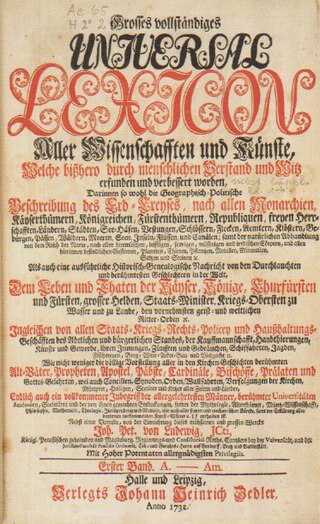
Johann Heinrich Zedler was a bookseller and publisher. His most important achievement was the creation of a German encyclopedia, the Grosses Universal-Lexicon , the largest and most comprehensive German-language encyclopedia developed in the 18th century.

The Grosses vollständiges Universal-Lexicon aller Wissenschafften und Künste is a 68-volume German encyclopedia published by Johann Heinrich Zedler between 1731 and 1754. It was one of the largest printed encyclopedias ever, and the first to include biographies of living people in a systematic way.

Cyclopædia: or, An Universal Dictionary of Arts and Sciences is an encyclopedia prepared by Ephraim Chambers and first published in 1728; six more editions appeared between 1728 and 1751 with a Supplement in 1753. The Cyclopædia was one of the first general encyclopedias to be produced in English.

Lexicon Technicum: or, An Universal English Dictionary of Arts and Sciences: Explaining not only the Terms of Art, but the Arts Themselves was in many respects the first alphabetical encyclopedia written in English. Although the emphasis of the Lexicon Technicum was on mathematical subjects, its contents go beyond what would be called science or technology today, in conformity with the broad eighteenth century understanding of the terms "arts" and "science," and it includes entries on the humanities and fine arts, notably on law, commerce, music, and heraldry. However, the Lexicon Technicum neglects theology, antiquity, biography, and poetry.
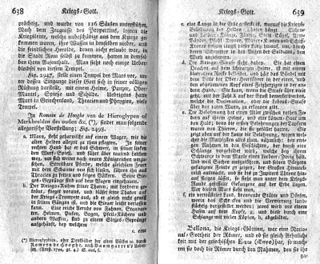
The Oeconomische Encyclopädie was a German language encyclopedia started by Johann Georg Krünitz. It appeared in 242 volumes between 1773 and 1858. Each volume has about 600–800 pages, giving a total of about 170,000 pages.

The Historical Dictionary of Switzerland is an encyclopedia on the history of Switzerland. It aims to present the history of Switzerland in the form of an encyclopaedia, published both on paper and on the Internet, in three of the country's national languages: German, French and Italian. When it was completed at the end of 2014, the paper version contained around 36,000 articles divided into thirteen volumes.At the same time, a reduced edition of the dictionary has been published in Romansh under the title Lexicon istoric retic (LIR), and constitutes the first specialist dictionary in the Rhaeto-Romance, Switzerland.
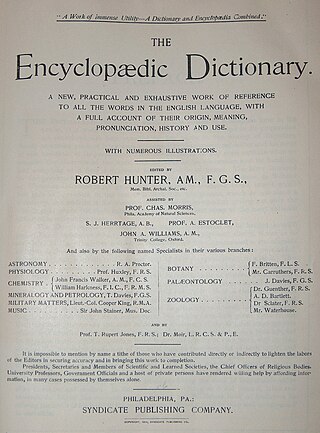
An encyclopedic dictionary typically includes many short listings, arranged alphabetically, and discussing a wide range of topics. Encyclopedic dictionaries can be general, containing articles on topics in many different fields; or they can specialize in a particular field, such as art, biography, law, medicine, or philosophy. They may also be organized around a particular academic, cultural, ethnic, or national perspective.
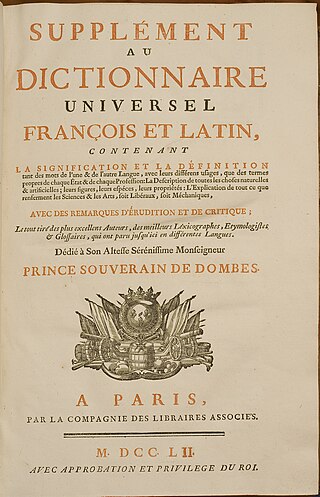
The Dictionnaire de Trévoux, also titled Dictionnaire universel françois et latin, is a French dictionary that appeared in several editions from 1704 to 1771. It was unofficially and then officially nicknamed Dictionnaire de Trévoux because of its original publication in the town of Trévoux Throughout the 18th century, it was widely assumed to be directed by the Jesuits, a supposition supported by at least some modern scholars.
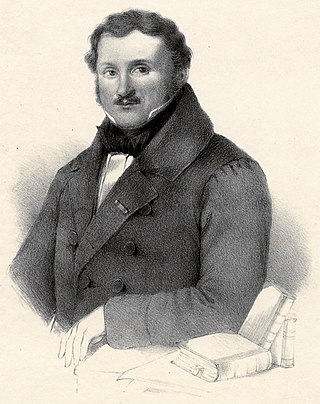
Heinrich August Pierer was a German officer, lexicographer and publisher known particularly for his Universal-Lexikon der Gegenwart und Vergangenheit, a multi-volume encyclopedic dictionary first published in 1824 as Encyclopädisches Wörterbuch der Wissenschaften, Künste und Gewerbe. Bearbeitet von mehreren Gelehrten ; it is considered "the first full-fledged modern general lexicon".
The Popular Encyclopedia or Conversations Lexicon was a British encyclopedia that was published from 1837 to 1893 by Blackie and Son, of Glasgow. It was originally a reprint of Francis Lieber's Encyclopedia Americana, itself based on the Brockhaus Enzyklopädie.

Encyclopedias have progressed from the beginning of history in written form, through medieval and modern times in print, and most recently, displayed on computer and distributed via computer networks.

The Encyclopedia of Yverdon is an encyclopedia compiled by Fortunato Bartolomeo de Félice and published in 58 volumes from 1770 through 1780 in Yverdon-les-Baines, Switzerland. The Encyclopedia of Yverdon is not as culturally French nor as philosophically skeptical of religion as the work it is based upon, the Encyclopédie of Diderot and d'Alembert. Due to these differences, the Encyclopedia of Yverdon was known as the Protestant encyclopedia and was widely distributed across Northern Europe.











